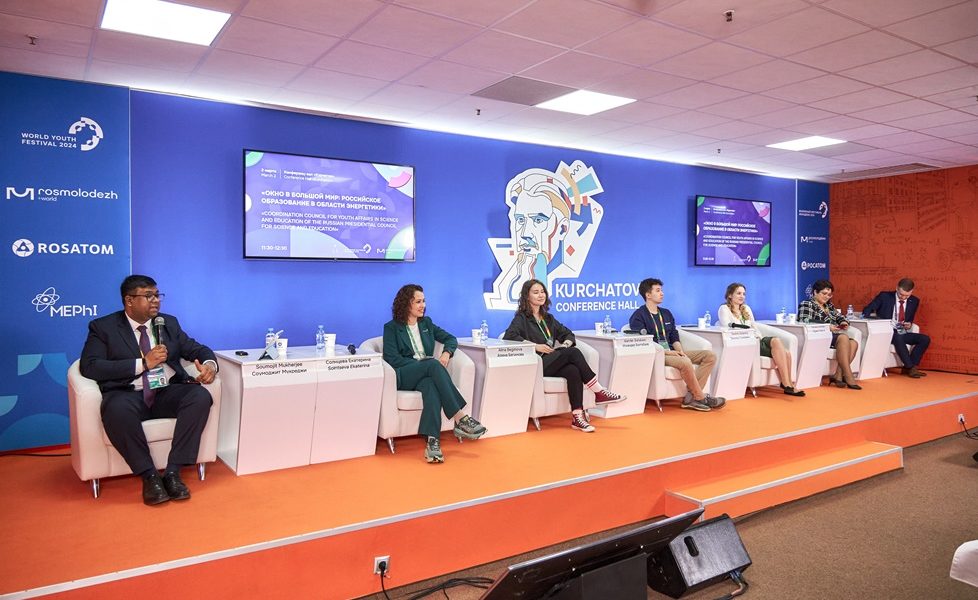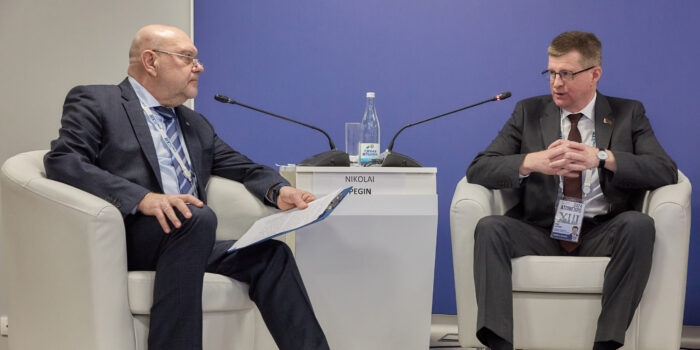Four students from India, Kazakhstan, Uzbekistan, and Bosnia and Herzegovina, who are studying nuclear and related specialties in Russia, spoke at the round table “Window to the Big World: Russian Energy Education”.
The attendees of the discussion included Ekaterina Solntseva, Head of the Scientific and Technical Department of OKB Gidropress and Chairman of the Council of Young Scientists of Rosatom State Corporation; Tatiana Osipova, Deputy Director of the Institute of Atomic Energy at MEPhI; Egor Zadeba, Associate Professor at MEPhI and member of the Coordination Council for Youth Affairs in the Scientific and Educational Spheres; as well as students from Rosatom's core universities. Soumojit Mukreji, a MEPhI student from India and an ambassador of Russian nuclear education, moderated the meeting.
The experts discussed their experience of studying in Russia with the event participants. They also talked about the questions that arise among the younger generation when choosing nuclear specialities and how education at leading Russian universities appears from the students' perspective. Furthermore, the participants of the event discussed Rosatom's role in enhancing the professional growth and career advancement of young professionals.
Tatiana Osipova talked about the opportunities available to students in Rosatom's new educational project, “Obninsk Tech”. It offers joint programmes with industrial partners and academic programmes with Rosatom and university partners worldwide. She noted: “Our goal is to become a well-known platform for nuclear engineers worldwide. They should realize that Obninsk is the place to go for quality education and serious content”.
In response to a question on why the students chose to study at a Russian university, the students said it was because of a desire to make a career in science and to acquire the latest knowledge in the field of nuclear technology. Therefore, they chose Rosatom's core universities, where they can learn a sought-after specialty and gain experience from world-class experts. This is made possible through the cooperation between the relevant universities and the State Corporation.
A student of IATE MEPhI, and a scholarship holder of the IAEA Maria Sklodowska-Curie Programme, described the high level of education that enables graduates to build successful careers and participate in international scientific projects. Alina Begimova stated that the nuclear industry has the potential to elevate her country to a new stage of energy development, marking the beginning of a new era for Kazakhstan. Large-scale progress is only possible with individuals who are passionate about it and have received professional training from one of Rosatom's core universities.
Ekaterina Solntseva discussed career opportunities and shared her personal experience. She encouraged students to embrace challenging tasks and to deepen their knowledge in their chosen field. She said: “Improving existing energy sources and developing new ones is crucial to solving energy problems”. Solntseva is convinced that there will always be a place in this field for talented young people with passion, determination and the ability to think critically.
Reference
The World Youth Festival is held to promote international youth cooperation and is attended by 20,000 young leaders in education, science, international cooperation, culture, volunteering and charity, sports, business, and media, including 10,000 foreign participants. For the first time, teenagers can participate in the festival through the track of the all-Russian movement of children and youth “Movement of the First”.
The Consortium of Supporting Higher Education Institutions of Rosatom State Corporation is a community of higher education institutions established to coordinate activities in the interests of the nuclear industry in the sphere of higher, postgraduate, and additional professional education. Members of the consortium include N. I. Lobachevsky National Research Lobachevsky State University, National Research Tomsk Polytechnic University, and others.
Obninsk Tech is an international research and education centre for nuclear and related technologies, implemented in Obninsk to meet the growing demand of partner countries for qualified personnel. The centre unites the efforts of Rosatom's leading core universities and research organisations, enabling the training of personnel to work at NPPs of Russian design in Russia and abroad, as well as conducting large-scale scientific activities. By 2030, Obninsk Tech plans to host 10,000 Russian and foreign students studying nuclear and related specialties. Rosatom, along with its supporting universities, aims to occupy at least 20% of the global market for nuclear physics education.
Russia is actively expanding cooperation with friendly nations, implementing large joint energy projects, in which Rosatom and its divisions play an active role.





